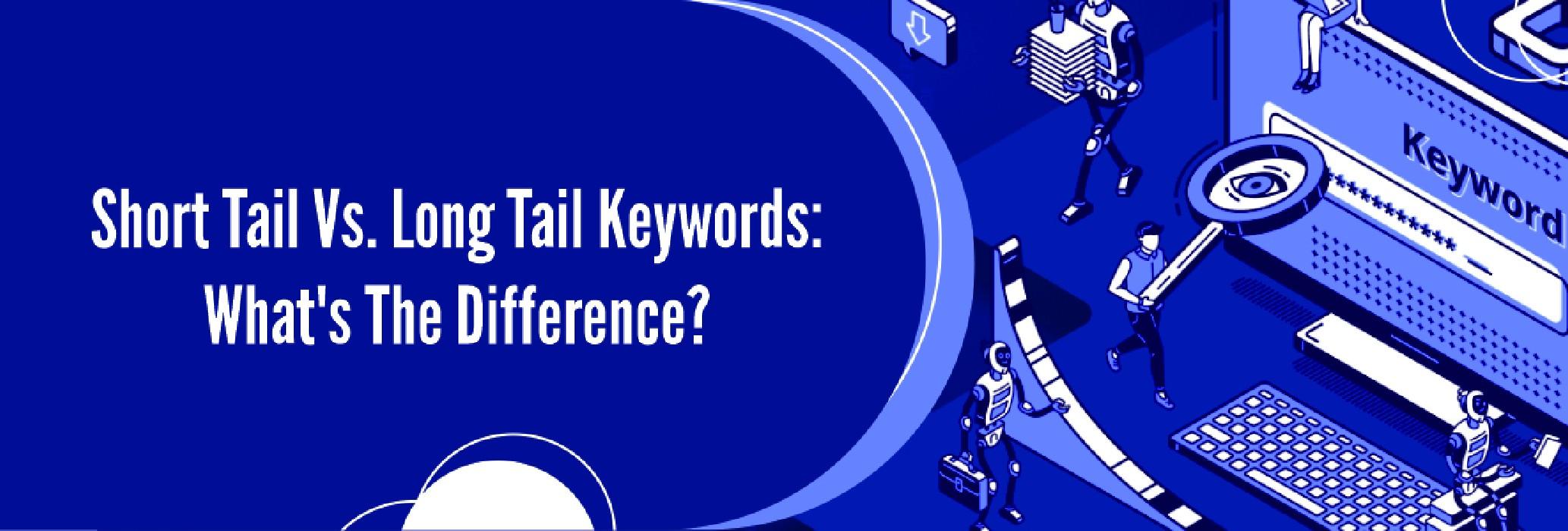








Short Tail Vs. Long Tail Keywords: What’s The Difference? PUBLISHED BY: captain PUBLISHED ON: August 30, 202 2 P U B LI S H ED I N: Digital Marketing Home About Us Digital Transformation Development Services Partner With Us Blog Contact Us Get Free An
If you are someone who is considering SEO marketing for your business, then you must have heard about the importance of keywords and how effectively chosen keywords can really change the game for you.
These keywords help search engines find better results that are relevant to the user’s search intent. The traffic to your web page is almost entirely focused on good, effective keywords. Ranking higher in Google rankings is also possible with good keywords. Let’s just say keywords are the blood and bone of your website’s content and search engines. When it comes to search engine optimization and content marketing, good keywords are usually a key component. Now there are two types of keywords, and both are beneficial in their own ways. We have short-tail keywords that are usually preferred if you want general search queries, whereas long-tail keywords are more specific to the search. In this article, let us learn mo re about the difference between long tail and short tail keywords and how important they are to your website.
Short Ta il Keywords






If you are looking for keywords that provide general information, then it will be best if you consider shorttail keywords. For example, if you are simply using terms like “computers” or “marketing”, then it gets harder for the search engines to specifically determine your intent. This is how short-tail keywords, or head terms, work. They don’t provide you with any particular knowledge, but they have high search volumes. If the user searches for “computers”, then the possibility of the outcome is high. However, if the keywords are general, the search intent can vary and will most likely be irrelevant. But short-tail keywords have higher search volume, which means more online visitors. The competition is very high when it comes to short-tail keywords as well. This also causes difficulty in ranking.
Long Ta il Keywords
Compared to short-tail keywords, long-tail keywords are more specific as they tend to focus on different users at different stages of the search process. User intent is said to be much more relevant, making its conversion rates higher. It has more than three words, and users usually prefer it when doing voice searches or online shopping. With all these advantages, the long tail keywords are still lower in terms of volume rate as they are not as popular as the short tail keywords. But since they are more user-specific, the
results are accurate. If you are someone who prefers quality over quantity, then long tail keywords are most likely for you because they don’t offer many website visits but the results are more accurate, which is said to satisfy the user’s needs. This is also one way to increase your website’s traffic.
Why You Should And Shouldn’t Use Short Tail Keywords?
Short-tail keywords have their pros and cons as well. Regardless of how much they generate traffic to your website, if you are someone who is new to this traffic business, then you are basically catching an empty straw. Now, the pros of doing short-tail keyword research for your website would be the increasing volume rates. Organic traffic can be generated along with some good rankings if you use proper short-tail keywords. The cons of using it are listed below:
No focus: Short-tail keywords do not offer any focus to the online searches and do not provide the user’s needs as much. For example, if you are using the keyword “laptops” in your search, then you are looking for laptops that can be purchased or sold or even a place to customize your laptop. But simple, short terms like this pull the focus away from the actual intent and increase the rankings of brands like Apple, Windows, HP, etc.
Too much competition: with the high search volume rate, the competition also increases if you opt for short-tail keywords. For example, if you are using keywords like ‘chocolate’ in your search engine, then websites such as Cadbury’s will be gaining the traffic and not you.
Conversion rates are low: Compared to long-tail keywords, short-tail keywords have lower conversion rates where you get only one or two customers even after 10,000 searches and 100 clicks.
Pros And Cons Of Long Tail Keywords
Long-tail keyword research has proven to be more beneficial and effective than short-tail keywords. If used correctly, long-tail keywords have a lot of benefits. Some of the common advantages of using long-
tail keywords are:
No competition: The competition is comparatively lower than for short-tail keywords. For example, if you use keywords like ‘coffee shops in Chennai’ on the search engine, then the pages that offer content about coffee shops in Chennai city will appear. These specific keywords will work in your favor, which might also increase your traffic as well.
More focus: The keywords are more focused if they are long-tail. Using these keywords will guarantee you good traffic for your business as well. For example, if your website offers dog raincoats that are yellow, then keywords like “yellow raincoat for dogs” in the search engine will directly bring users to your website, thus increasing your website traffic.
Cheaper than usual: One of the first things I realized from long-tail keyword research is that they are cheaper than short-tail keywords. Keyword research tools such as Google AdWords tend to charge a lower price for searches that contain specific long-tail keywords.
They do have some cons as well. One particular con of using long-tail keywords would be the low traffic factor. They tend to generate low traffic compared to short-tail keywords, which is bad for some businesses. But if you have a specific target audience, then this characteristic feature may be useful for you. This avoids those time-wasting users who clutter your website without going anywhere.
Which Is Better?
After careful consideration, the conclusion is pretty simple. Long-tail keywords are much better and more effective. However, choosing what’s best for your business is very important. Having more organic traffic is recommended if you want to expand your business. Also, keep in mind that the satisfaction of the customers is much more important than just getting clicks to your site. In this modern era, short-tail keywords are not advisable if you are looking into the rankings as it makes the online searching process more difficult. But if your brand offers a general set of items, then maybe short-tail keywords will work for you; if not, always opt for long-tail keywords. A long-tail keyword is an ultimate winner. It has a higher
conversion rate, lower cost, lower competition, and volume that specifies the search, making it easier to browse. Using a keyword research tool will only take you so far. Sometimes you have to do the extra groundwork to ensure the website is in check. If your brand sells makeup, then makeup will be the shorttail keyword, to begin with. Also, make sure your website has good headings, whether it is short-tail or long-tail. Another key factor in boosting your website’s traffic is watching out for your competitors. Their title tags, headings, and the keywords they used that boosted their website must be noted as they can greatly help your profile as well. Locational keywords go a long way also. It is one of the best ways to target the users who live near your business. For example, if you own a bakery in Chennai and supposedly your user searches for ‘bakeries in Chennai’, then make sure your website pops up in the results. Using keywords with the location mentioned in them is an ideal way to promote your sales. Not every user has the intention of making a purchase every time they search for a product. Some of them might be looking for information based on the product before making any decision. Therefore, try to provide information about your product that is easily available and user-friendly. Asking questions is also an excellent basis for long-tail keywords. So make sure you include questions in your research as well. For some people, this process might be a bit hard and overwhelming. But remember, all this work will one day come to fruition.
Related Posts:
What types of blogs generate the most traffic in 2021?
7 steps to develop successful marketing strategy for your






Enter Your Email Monetize Your Website Through Search Engine Optimization Now! Subscribe to Newsletter Get In Touch With Full Fledged Digital Marketing Agency. Important Info. USA +1 (512) 607 6820 IND +91 98193 83948 inquiry@thecuneiform.com C 102, S . G. B usiness Hub, Off Gota Flyover, S. G. Highway, Vasantnagar, Ognaj, Ahmedabad, Gujarat 380060 Quick Links SEO Service PPC Marketin g SMO Service Digital Marketin g Privacy Policy Terms & Conditio ns Refund Policy About Cuneiform We help you in improving your business model with the help of digital marketing, custom web development, and mobile application technologies. We are located in Ahmedabad, Mumbai and Oregon (USA). Discover More business in 202 1
Copyright@ 2022 Cuneiform, Powered by Cuneiform Consulting. All Rights Reserved
PDFmyURL.com - convert URLs, web pages or even full websites to PDF online. Easy API for developers!

Get
Free Audit Repor t










